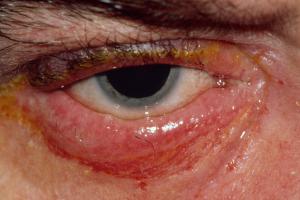Blepharitis
Blepharitis is a common condition where the edges of the eyelids (eyelid margins) become red and swollen (inflamed). Blepharitis can develop at any age.
Symptoms of blepharitis
Symptoms of blepharitis can include:
- itchy, sore and red eyelids that stick together
- crusty or greasy eyelashes
- a burning, gritty sensation in your eyes
- increased sensitivity to light (photophobia)
- swollen eyelid margins
- finding contact lenses uncomfortable to wear
- abnormal eyelash growth or loss of eyelashes in severe cases

In most cases both eyes are affected. One eye can be more affected than the other.
The symptoms tend to be worse in the morning.
When to get medical advice
See your optician (optometrist) if you have persistent symptoms of blepharitis that aren't being controlled by eyelid hygiene measures.
They can examine you to check if the problem is caused by an underlying condition. They may also refer you to an eye specialist.
Contact your optometrist or GP immediately if you have any sudden severe symptoms, or your vision is suddenly reduced. If this isn't possible, visit your nearest emergency department.
How blepharitis is treated
Blepharitis is usually a long-term condition. Most people experience repeated episodes, separated by periods without symptoms.
It can't usually be cured. A daily eyelid-cleaning routine can help control the symptoms and prevent permanent scarring of the eyelid margins.
There are three main steps to eyelid hygiene that should be carried out once or twice a day:
- using a warm compress – to make the oil produced by the glands around your eyes more runny
- gently massaging your eyelids – to push the oils out of the glands
- cleaning your eyelids – to wipe away any excess oil and remove any crusts, bacteria, dust or grime that might have built up
More severe cases may require antibiotics. Your optician (optometrist) or GP can advise you about the best treatment.
Causes of blepharitis
There are three main types of blepharitis:
- anterior blepharitis – where the inflammation affects the skin around the base of your eyelashes
- posterior blepharitis – where the inflammation affects your Meibomian glands, found along the eyelid margins behind the base of the eyelashes
- mixed blepharitis – a combination of both anterior and posterior blepharitis
Anterior blepharitis can be caused by either:
- a reaction to Staphylococcus bacteria – these usually live harmlessly on the skin of many people, but for unknown reasons they can cause the eyelids to become inflamed
- seborrhoeic dermatitis – a skin condition that causes skin to become oily or flaky and sometimes irritate the eyelids, causing the Meibomian glands to block
Posterior blepharitis is caused by a problem with the Meibomian glands. This is where the glands get blocked by either debris, skin flakes or inflammation.
Sometimes blockages in the Meibomian glands are associated with a skin condition called rosacea. If too much oily substance is being produced, this may be caused by seborrhoeic dermatitis.
Mixed blepharitis is the most common. It is caused by a combination of both anterior and posterior blepharitis. Blepharitis isn't contagious.
More useful links
The information on this page has been adapted from original content from the NHS website.
For further information see terms and conditions.